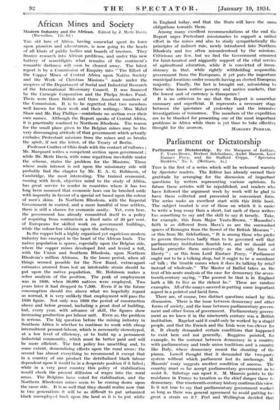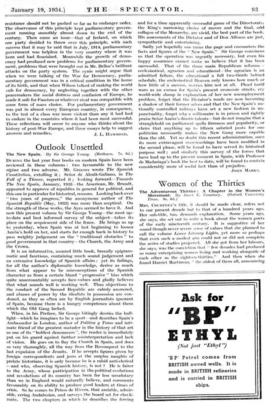Parliament or Dictatorship
Parliament or Dictatorship. By the Marquess of Lothian, F. Yeats-Brown, Herbert Sidebotham, Andre Maurois, Lord Eustace Percy, and Sir Stafford Cripps. " Spectator Booklets," No. 1. (Methuen. Is.) THIS is the first of a series which will be welcomed warmly by Spectator readers. The Editor has already earned their gratitude by arranging for the discussion of important questions by writers representing various opinions. In future these articles will be republished, and readers who
have followed the argument week by week will be glad to have them collected and presented in convenient form.
The series make an excellent start with this little book. The subject treated is one of those on which it is easier to write a long essay than a short, but each of these writers has something to say and the skill to say it tersely. Take. for example, this from Major Yeats-Brown, " Mussolini's faith is as different from Marx's as are the sunwashed spaces of Romagna from the frowst of the British Museum " ; or this from Mr. Sidebotham, " It is among those who prefer to govern themselves badly than to be governed well that parliamentary institutions flourish best, and we should not hastily prescribe them universally as the only form of liberty " ; or this from Lord Eustace Percy, Parliament ought not to be a talking shop, but it ought to be a merchant
• of talk ; the trouble comes when it does its talking by retail instead of wholesale." The Master of Balliol takes as, the text of his acute analysis of the case for democracy the seven- teenth-century saying, " The poorest he that is in England hath a life to live as the richest he." These are random
examples. All of the essays succeed in putting some important aspect in a pointed and lucid form.
There are, of course, two distinct questions raised by this discussion. There is the issue between democracy and other forms of society, and the issue between parliamentary govern- ment and other forms of government. Parliamentary govern- ment as we knew it in the nineteenth century was a British institution. Bagehot said it could only be worked by a stupid people, and that the French and the Irish were too clever for it. It clearly demanded certain conditions that happened to exist here and not generally. Ruggiero pointed, for example, to the contrast between democracy in a country with parliamentary and trade union traditions and a country like Italy, where democracy meant the shouting of the piazza. Lowell thought that it demanded the two-party system without which parliament lost its anchorage. M.
Maurois' essay suggests another condition of success. The country must so far accept parliamentary government as to assist it. Sabotage can upset it. M. Maurois points to the resisfance in France to taxation as the chief danger there to democracy. Our nineteenth-century history confirmsthis view.
Is it not true to say that parliamentary government worked so long RS there was general agreement to avoid putting too great a strain on it ? Peel and Wellington decided that resistance should not be pushed so far as to endanger order. The observance of this principle kept parliamentary govern- ment running smoothly almost down to the end of the century. Then came an issue—that of Ireland, on which one party decided to throw over this principle, with such success that it may be said that in July, 1914, parliamentary government was helpless in the very country where it was born and had flourished. Meanwhile the growth of demo- cracy had produced new problems for parliamentary govern- ment, problems that were brought out in Mr. Belloc's brilliant attacks on the party system. The cynic might argue that when we were talking of the War for Democracy, parlia- mentary government was in a critical condition in the home of its birth, and that when Wilson talked of making the world safe for democracy, by neglecting together with the other peacemakers the social distress and confusion of Europe, he made it safe for Fascism or whatever rival was compatible with some form of mass choice. For parliamentary government was put in almost every European country, in consequence, to the test of a class war more violent than any it had had to endure' in the countries where it had been most successful. These reflections will occur to anyone who thinks about the history of post-War Europe, and these essays help to suggest









































 Previous page
Previous page